Shiliuyun-Xinjiang Daily (Reporter Han Liang) news: "This is no ordinary brush. It carries the mission of cultural heritage and represents a lifetime of dedication," said Zhang Fuxiong on April 9, 2025, as he gently stroked a newly engraved black sandalwood brush at his studio on Youhao South Road in Saybag District, Urumqi City, northwest China’s Xinjiang Uygur Autonomous Region.
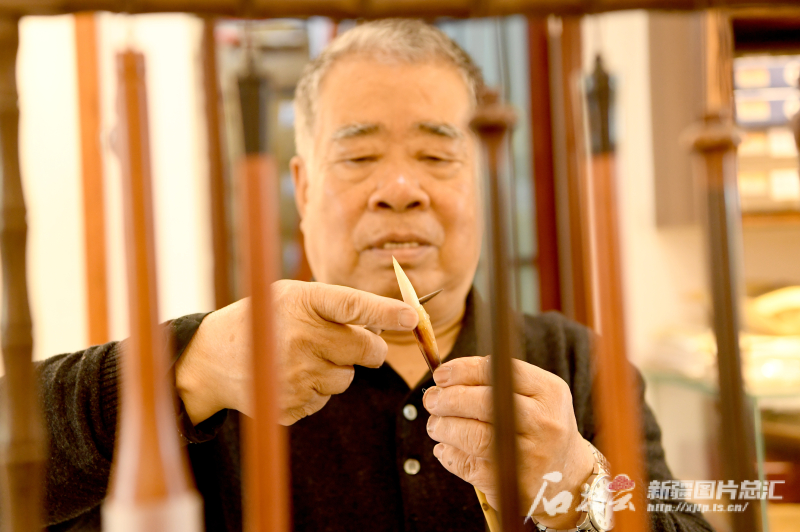
Photo taken on April 9, 2025 shows Zhang Fuxiong makes a brush at his studio on Youhao South Road in Saybag District, Urumqi City, northwest China’s Xinjiang Uygur Autonomous Region.
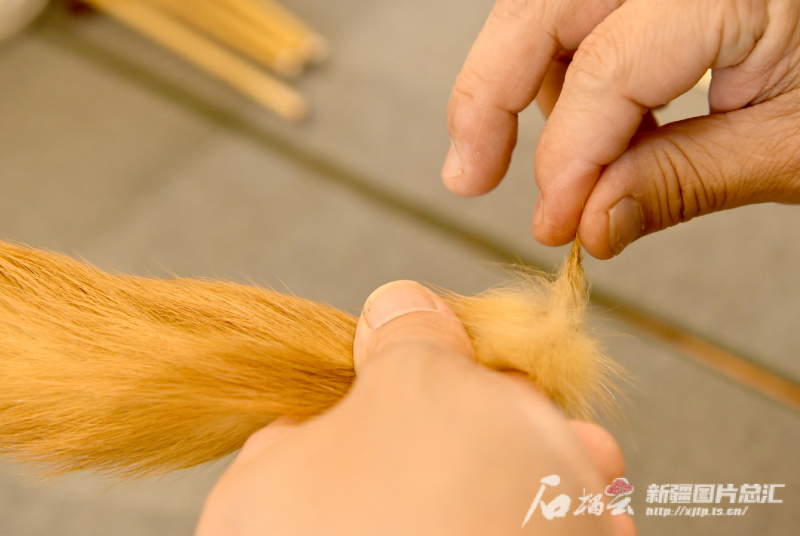
Photo taken on April 9, 2025 shows Zhang Fuxiong selects hair for a brush at his studio on Youhao South Road in Saybag District, Urumqi City, northwest China’s Xinjiang Uygur Autonomous Region.
"Zhang Fuxiong's Brush Studio" is well-known among calligraphy and traditional Chinese painting enthusiasts in Urumqi. The studio is small but packed with brushes, ink, paper, and inkstones. In one corner, Zhang has set up a tea table where customers often chat with him over tea while waiting for him to engrave personalized characters on their newly purchased brushes.
Zhang’s hometown is Wen’gang Town in Jinxian County, east China's Jiangxi Province—a place renowned as the "Brush Capital of China" and the "Hometown of Writing Brushes," steeped in profound brush-making culture. "I grew up immersed in the atmosphere of brush-making, and over time, I developed a deep interest in the craft," Zhang recalled.
In 1979, at the age of 27, Zhang Fuxiong arrived in Xinjiang with hopes for future and dreams of entrepreneurship. After settling in Urumqi, he opened a self-produced and self-sold brush shop on Xibei Road. However, the road to success was not smooth. At the time, professional stores selling traditional stationery were scarce in Urumqi, and market awareness was low. To break through, Zhang carried a bag full of brushes every day, traveling across the city to persuade people to try his products.

Photo taken on April 9, 2025 shows Zhang Fuxiong arranges brushes at his studio on Youhao South Road in Saybag District, Urumqi City, northwest China’s Xinjiang Uygur Autonomous Region.
"Those were truly tough times. Some people didn’t understand, but I always believed that as long as the brushes were of high quality, they would eventually gain recognition." His persistence paid off. Thanks to his exquisite craftsmanship and relentless pursuit of quality, Zhang’s brushes gradually won acclaim.
By the late 1980s, Zhang’s brushes had secured a place as a primary supplier in major department stores, attracting the attention of Urumqi’s calligraphy and painting enthusiasts, as well as established artists. Seeing the potential for brush-making in Xinjiang, Zhang decided to live here in 1997.
In 1999, Zhang Weisheng, then 16, followed in his father’s footsteps and came to Xinjiang. That same year, "Zhang Fuxiong's Brush Studio" officially opened, marking the beginning of a new journey for father and son.
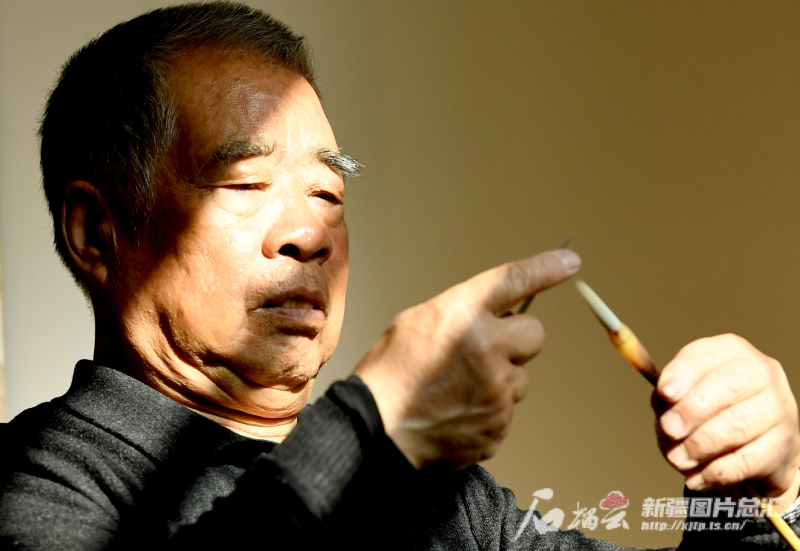
Photo taken on April 9, 2025 shows Zhang Fuxiong makes a brush at his studio on Youhao South Road in Saybag District, Urumqi City, northwest China’s Xinjiang Uygur Autonomous Region.
Brush-making is a meticulous craft. The creation of a single brush involves 120 intricate steps, each critical to its quality. Through long-term experimentation, Zhang adapted to Xinjiang’s dry climate, which caused traditional brush handles to crack, by switching to black sandalwood and rosewood. He also collected feedback to tailor his brushes to local writing habits.
Over time, the studio’s reputation grew, but Zhang faced a new challenge—fewer young people were willing to learn traditional handcrafting techniques.
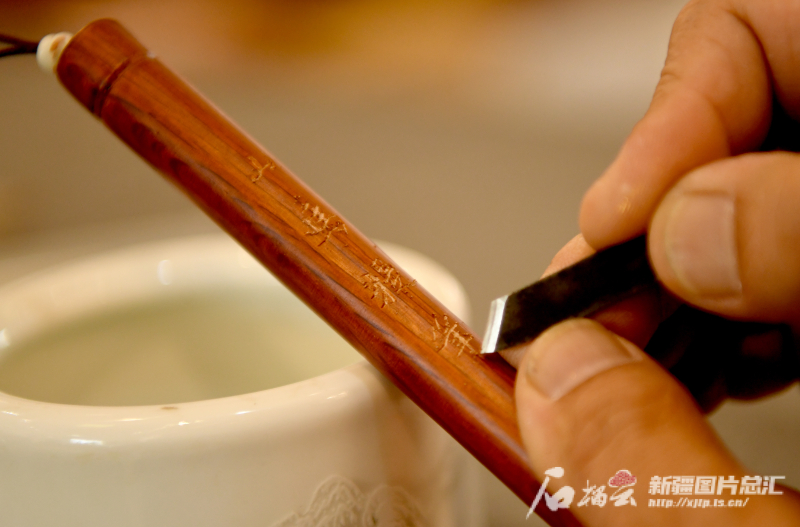
Photo taken on April 9, 2025 shows Zhang Fuxiong engraves characters on a brush handle at his studio on Youhao South Road in Saybag District, Urumqi City, northwest China’s Xinjiang Uygur Autonomous Region.
"Engraving is a tough job. The long learning process requires patience. Many young people today can't bear such hardships," Zhang said. Despite the difficulties, Zhang Weisheng, as the new-generation inheritor, remains committed to preserving the craft through his efforts.
In recent years, as society has placed greater emphasis on traditional culture, Zhang has seen new opportunities for his studio. Since 2010, many schools in Xinjiang have introduced calligraphy classes, and adult painting and calligraphy courses have emerged, leading to a surge in demand for brushes. The studio’s annual sales have grown from 2,000–3,000 brushes to 120,000 last year.
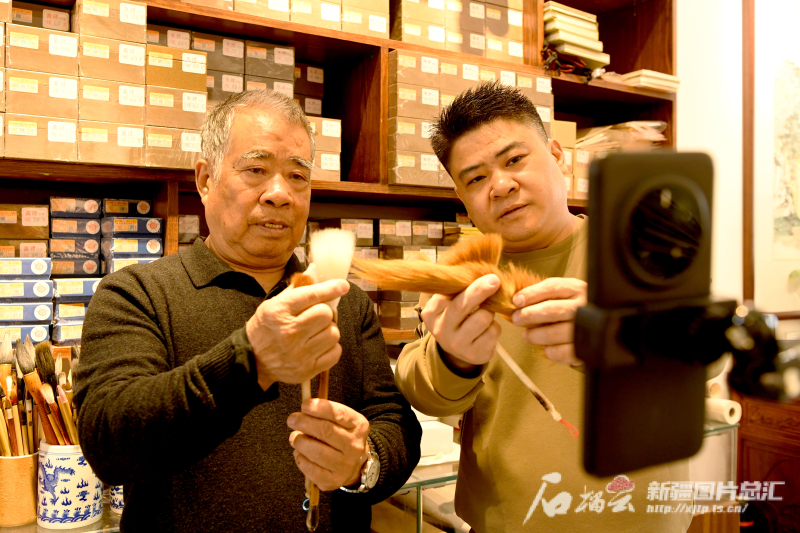
Photo taken on April 9, 2025 shows Zhang Fuxiong (left) and his son Zhang Weisheng promote brush-making techniques online at his studio on Youhao South Road in Saybag District, Urumqi City, northwest China’s Xinjiang Uygur Autonomous Region.
Adapting to market changes, Zhang adjusted his business strategy to focus on producing ordinary brushes that are suitable for beginners. "I want to make brushes accessible to more people, allowing them to experience the charm of traditional Chinese culture," Zhang said firmly.
In 2010, brush-making techniques were listed as an intangible cultural heritage item in Saybag District, Urumqi, and Zhang Fuxiong was recognized as a district-level intangible cultural heritage inheritor.
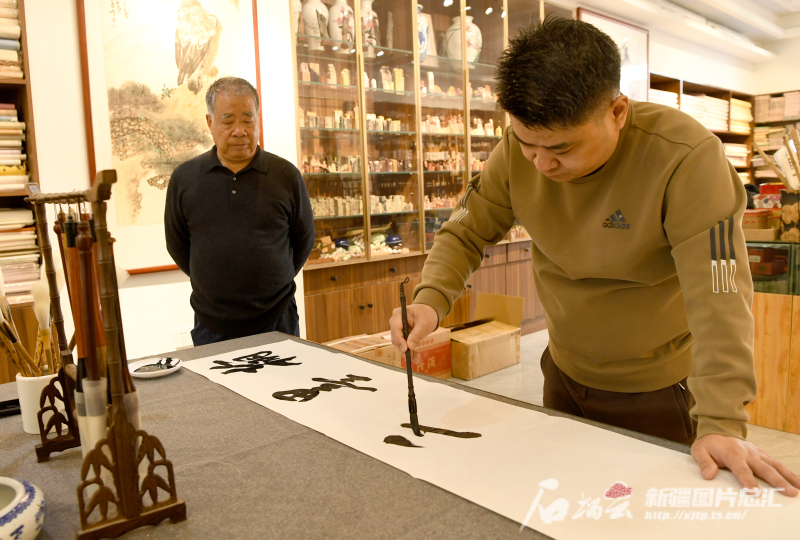
Photo taken on April 9, 2025 shows Zhang Weisheng (right) practices calligraphy at Zhang Fuxiong’s his studio on Youhao South Road in Saybag District, Urumqi City, northwest China’s Xinjiang Uygur Autonomous Region.
Today, "Zhang Fuxiong's Brush Studio" not only embodies a generation’s passion and dedication to brush-making but also shoulders the responsibility of preserving and promoting China’s outstanding traditional culture. Zhang Fuxiong is confident that the art of brush-making will shine even brighter in the hands of the next generation.
(A written permission shall be obtained for reprinting, excerpting, copying and mirroring of the contents published on this website. Unauthorized aforementioned act shall be deemed an infringement, of which the actor shall be held accountable under the law.)









